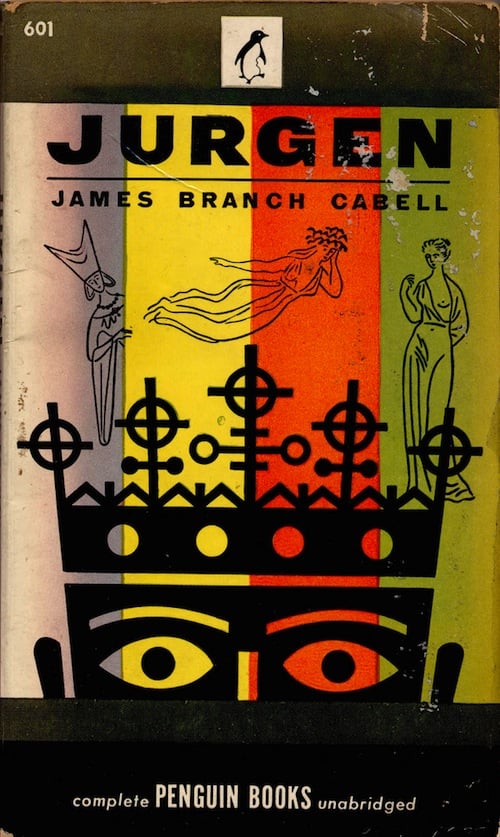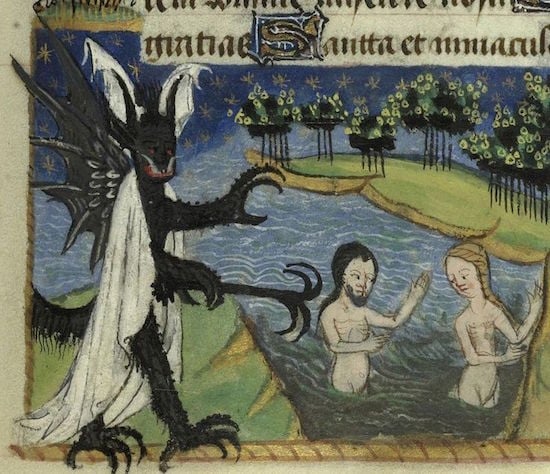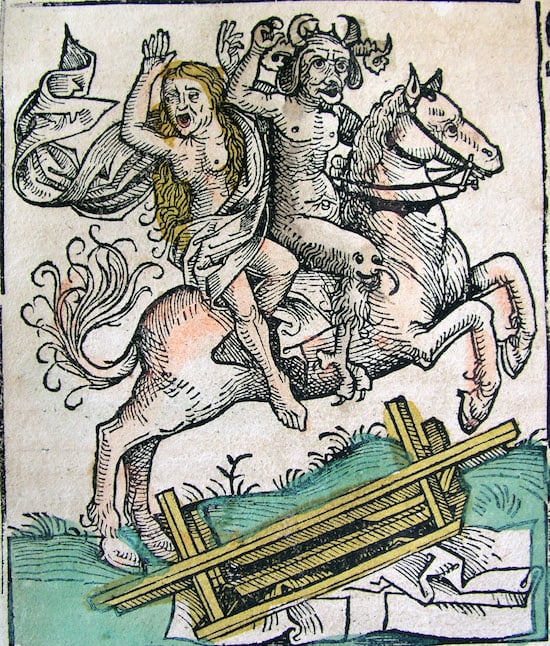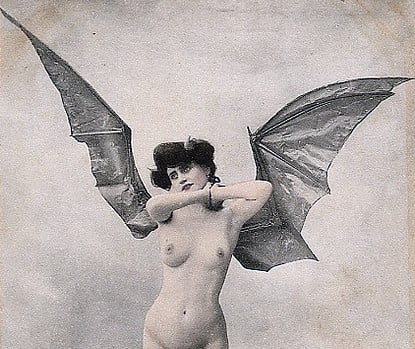Jurgen (37)
By:
November 27, 2015

James Branch Cabell’s 1919 ironic fantasy novel Jurgen, A Comedy of Justice, the protagonist of which seduces women everywhere he travels — including into Arthurian legend and Hell itself — is (according to Aleister Crowley) one of the “epoch-making masterpieces of philosophy.” Cabell’s sardonic inversion of romantic fantasy was postmodernist avant la lettre. HiLoBooks is pleased to serialize Jurgen here at HILOBROW. Enjoy!
Then Jurgen went back to Chorasma, where Coth, the son of Smoit and Steinvor, stood conscientiously in the midst of the largest and hottest flame he had been able to imagine, and rebuked the outworn devils who were tormenting him, because the tortures they inflicted were not adequate to the wickedness of Coth.
And Jurgen cried to his father: “The lewd fiend Cannagosta told you I was the Emperor of Noumaria, and I do not deny it even now. But do you not perceive I am likewise your son Jurgen?”
“Why, so it is,” said Coth, “now that I look at the rascal. And how, Jurgen, did you become an emperor?”
“Oh, sir, and is this a place wherein to talk about mere earthly dignities? I am surprised your mind should still run upon these empty vanities even here in torment.”
“But it is inadequate torment, Jurgen, such as does not salve my conscience. There is no justice in this place, and no way of getting justice. For these shiftless devils do not take seriously that which I did, and they merely pretend to punish me, and so my conscience stays unsatisfied.”
“Well, but, father, I have talked with them, and they seem to think your crimes do not amount to much, after all.”

Coth flew into one of his familiar rages. “I would have you know that I killed eight men in cold blood, and held five other men while they were being killed. I estimate the sum of such iniquity as ten and a half murders, and for these my conscience demands that I be punished.”
“Ah, but, sir, that was fifty years or more ago, and these men would now be dead in any event, so you see it does not matter now.”
“I went astray with women, with I do not know how many women.”
Jurgen shook his head. “This is very shocking news for a son to receive, and you can imagine my feelings. None the less, sir, that also was fifty years ago, and nobody is bothering over it now.”
“You jackanapes, I tell you that I swore and stole and forged and burned four houses and broke the Sabbath and was guilty of mayhem and spoke disrespectfully to my mother and worshipped a stone image in Porutsa. I tell you I shattered the whole Decalogue, time and again. I committed all the crimes that were ever heard of, and invented six new ones.”
“Yes, sir,” said Jurgen: “but, still, what does it matter if you did?”
“Oh, take away this son of mine!” cried Coth: “for he is his mother all over again; and though I was the vilest sinner that ever lived, I have not deserved to be plagued twice with such silly questions. And I demand that you loitering devils bring more fuel.”
“Sir,” said a panting little fiend, in the form of a tadpole with hairy arms and legs like a monkey’s, as he ran up with four bundles of faggots, “we are doing the very best we can for your discomfort. But you damned have no consideration for us, and do not remember that we are on our feet day and night, waiting upon you,” said the little devil, whimpering, as with his pitchfork he raked up the fire about Coth. “You do not even remember the upset condition of the country, on account of the war with Heaven, which makes it so hard for us to get you all the inconveniences of life. Instead, you lounge in your flames, and complain about the service, and Grandfather Satan punishes us, and it is not fair.”
“I think, myself,” said Jurgen, “you should be gentler with the boy. And as for your crimes, sir, come, will you not conquer this pride which you nickname conscience, and concede that after any man has been dead a little while it does not matter at all what he did? Why, about Bellegarde no one ever thinks of your throat-cutting and Sabbath-breaking except when very old people gossip over the fire, and your wickedness brightens up the evening for them. To the rest of us you are just a stone in the churchyard which describes you as a paragon of all the virtues. And outside of Bellegarde, sir, your name and deeds mean nothing now to anybody, and no one anywhere remembers you. So really your wickedness is not bothering any person now save these poor toiling devils: and I think that, in consequence, you might consent to put up with such torments as they can conveniently contrive, without complaining so ill-temperedly about it.”
“Ah, but my conscience, Jurgen! that is the point.”
“Oh, if you continue to talk about your conscience, sir, you restrict the conversation to matters I do not understand, and so cannot discuss. But I dare say we will find occasion to thresh out this, and all other matters, by and by: and you and I will make the best of this place, for now I will never leave you.”
Coth began to weep: and he said that his sins in the flesh had been too heinous for this comfort to be permitted him in the unendurable torment which he had fairly earned, and hoped some day to come by.
“Do you care about me, one way or the other, then?” says Jurgen, quite astounded.
And from the midst of his flame Coth, the son of Smoit, talked of the birth of Jurgen, and of the infant that had been Jurgen, and of the child that had been Jurgen. And a horrible, deep, unreasonable emotion moved in Jurgen as he listened to the man who had begotten him, and whose flesh was Jurgen’s flesh, and whose thoughts had not ever been Jurgen’s thoughts: and Jurgen did not like it. Then the voice of Coth was bitterly changed, as he talked of the young man that had been Jurgen, of the young man who was idle and rebellious and considerate of nothing save his own light desires; and of the division which had arisen between Jurgen and Jurgen’s father Coth spoke likewise: and Jurgen felt better now, but was still grieved to know how much his father had once loved him.
“It is lamentably true,” says Jurgen, “that I was an idle and rebellious son. So I did not follow your teachings. I went astray, oh, very terribly astray. I even went astray, sir I must tell you, with a nature myth connected with the Moon.”

“Oh, hideous abomination of the heathen!”
“And she considered, sir, that thereafter I was likely to become a solar legend.”
“I should not wonder,” said Coth, and he shook his bald and dome-shaped head despondently. “Ah, my son, it simply shows you what comes of these wild courses.”
“And in that event, I would, of course, be released from sojourning in the underworld by the Spring Equinox. Do you not think so, sir?” says Jurgen, very coaxingly, because he remembered that, according to Satan, whatever Coth believed would be the truth in Hell.
“I am sure,” said Coth — “why, I am sure I do not know anything about such matters.”
“Yes, but what do you think?”
“I do not think about it at all.”
“Yes, but —”
“Jurgen, you have a very uncivil habit of arguing with people —”
“Still, sir —”
“And I have spoken to you about it before —”
“Yet, father —”
“And I do not wish to have to speak to you about it again —”
“None the less, sir —”
“And when I say that I have no opinion —”
“But everybody has an opinion, father!” Jurgen shouted this, and felt it was quite like old times.
“How dare you speak to me in that tone of voice, sir!”
“But I only meant —”

“Do not lie to me, Jurgen! and stop interrupting me! For, as I was saying when you began to yell at your father as though you were addressing an unreasonable person, it is my opinion that I know nothing whatever about Equinoxes! and do not care to know anything about Equinoxes, I would have you understand! and that the less said as to such disreputable topics the better, as I tell you to your face!”
And Jurgen groaned. “Here is a pretty father! If you had thought so, it would have happened. But you imagine me in a place like this, and have not sufficient fairness, far less paternal affection, to imagine me out of it.”
“I can only think of your well merited affliction, you quarrelsome scoundrel! and of the host of light women with whom you have sinned! and of the doom which has befallen you in consequence!”
“Well, at worst,” says Jurgen, “there are no women here. That ought to be a comfort to you.”
“I think there are women here,” snapped his father. “It is reputed that quite a number of women have had consciences. But these conscientious women are probably kept separate from us men, in some other part of Hell, for the reason that if they were admitted into Chorasma they would attempt to tidy the place and make it habitable. I know your mother would have been meddling out of hand.”
“Oh, sir, and must you still be finding fault with mother?”
“Your mother, Jurgen, was in many ways an admirable woman. But,” said Coth, “she did not understand me.”
“Ah, well, that may have been the trouble. Still, all this you say about women being here is mere guess-work.”
“It is not!” said Coth, “and I want none of your impudence, either. How many times must I tell you that?”
Jurgen scratched his ear reflectively. For he still remembered what Grandfather Satan had said, and Coth’s irritation seemed promising.
“Well, but the women here are all ugly, I wager.”
“They are not!” said his father, angrily. “Why do you keep contradicting me?”
“Because you do not know what you are talking about,” says Jurgen, egging him on. “How could there be any pretty women in this horrible place? For the soft flesh would be burned away from their little bones, and the loveliest of queens would be reduced to a horrid cinder.”
“I think there are any number of vampires and succubi and such creatures, whom the flames do not injure at all, because these creatures are informed with an ardor that is unquenchable and is more hot than fire. And you understand perfectly what I mean, so there is no need for you to stand there goggling at me like a horrified abbess!”

“Oh, sir, but you know very well that I would have nothing to do with such unregenerate persons.”
“I do not know anything of the sort. You are probably lying to me. You always lied to me. I think you are on your way to meet a vampire now.”
“What, sir, a hideous creature with fangs and leathery wings!”
“No, but a very poisonous and seductively beautiful creature.”
“Come, now! you do not really think she is beautiful.”
“I do think so. How dare you tell me what I think and do not think!”
“Ah, well, I shall have nothing to do with her.”
“I think you will,” said his father: “ah, but I think you will be up to your tricks with her before this hour is out. For do I not know what emperors are? and do I not know you?”
And Coth fell to talking of Jurgen’s past, in the customary terms of a family squabble, such as are not very nicely repeatable elsewhere. And the fiends who had been tormenting Coth withdrew in embarrassment, and so long as Coth continued talking they kept out of earshot.
Footnotes from Notes on Jurgen (1928), by James P. Cover — with additional comments from the creators of this website; rewritten, in some instances, by HiLoBooks.
* Porutsa — Coth’s adventures in Porutsa are related in Book Four of The Silver Stallion. Therein, Porutsa is a city of the Toltecs, the ancient people who ruled in Mexico before the Aztecs came.
RADIUM AGE SCIENCE FICTION: “Radium Age” is HILOBROW’s name for the 1904–33 era, which saw the discovery of radioactivity, the revelation that matter itself is constantly in movement — a fitting metaphor for the first decades of the 20th century, during which old scientific, religious, political, and social certainties were shattered. This era also saw the publication of genre-shattering writing by Edgar Rice Burroughs, Sax Rohmer, E.E. “Doc” Smith, Jack London, Arthur Conan Doyle, Aldous Huxley, Olaf Stapledon, Karel Čapek, H.P. Lovecraft, Charlotte Perkins Gilman, Yevgeny Zamyatin, Philip Gordon Wylie, and other pioneers of post-Verne/Wells, pre-Golden Age “science fiction.” More info here.
READ GORGEOUS PAPERBACKS: HiLoBooks has reissued the following 10 obscure but amazing Radium Age science fiction novels in beautiful print editions: Jack London’s The Scarlet Plague, Rudyard Kipling’s With the Night Mail (and “As Easy as A.B.C.”), Arthur Conan Doyle’s The Poison Belt, H. Rider Haggard’s When the World Shook, Edward Shanks’ The People of the Ruins, William Hope Hodgson’s The Night Land, J.D. Beresford’s Goslings, E.V. Odle’s The Clockwork Man, Cicely Hamilton’s Theodore Savage, and Muriel Jaeger’s The Man with Six Senses. For more information, visit the HiLoBooks homepage.
SERIALIZED BY HILOBOOKS: Jack London’s The Scarlet Plague | Rudyard Kipling’s With the Night Mail (and “As Easy as A.B.C.”) | Arthur Conan Doyle’s The Poison Belt | H. Rider Haggard’s When the World Shook | Edward Shanks’ The People of the Ruins | William Hope Hodgson’s The Night Land | J.D. Beresford’s Goslings | E.V. Odle’s The Clockwork Man | Cicely Hamilton’s Theodore Savage | Muriel Jaeger’s The Man With Six Senses | Jack London’s “The Red One” | Philip Francis Nowlan’s Armageddon 2419 A.D. | Homer Eon Flint’s The Devolutionist | W.E.B. DuBois’s “The Comet” | Edgar Rice Burroughs’s The Moon Men | Charlotte Perkins Gilman’s Herland | Sax Rohmer’s “The Zayat Kiss” | Eimar O’Duffy’s King Goshawk and the Birds | Frances Hodgson Burnett’s The Lost Prince | Morley Roberts’s The Fugitives | Helen MacInnes’s The Unconquerable | Geoffrey Household’s Watcher in the Shadows | William Haggard’s The High Wire | Hammond Innes’s Air Bridge | James Branch Cabell’s Jurgen | John Buchan’s “No Man’s Land” | John Russell’s “The Fourth Man” | E.M. Forster’s “The Machine Stops” | John Buchan’s Huntingtower | Arthur Conan Doyle’s When the World Screamed | Victor Bridges’ A Rogue By Compulsion | Jack London’s The Iron Heel | H. De Vere Stacpoole’s The Man Who Lost Himself | P.G. Wodehouse’s Leave It to Psmith | Richard Connell’s “The Most Dangerous Game” | Houdini and Lovecraft’s “Imprisoned with the Pharaohs” | Arthur Conan Doyle’s “The Sussex Vampire.”
ORIGINAL FICTION: HILOBROW has serialized three novels: James Parker’s The Ballad of Cocky The Fox (“a proof-of-concept that serialization can work on the Internet” — The Atlantic); Karinne Keithley Syers’s Linda Linda Linda (which includes original music); and Robert Waldron’s roman à clef The School on the Fens. We also publish original stories and comics. These include: Matthew Battles’s stories “Gita Nova“, “Makes the Man,” “Imago,” “Camera Lucida,” “A Simple Message”, “Children of the Volcano”, “The Gnomon”, “Billable Memories”, “For Provisional Description of Superficial Features”, “The Dogs in the Trees”, “The Sovereignties of Invention”, and “Survivor: The Island of Dr. Moreau”; several of these later appeared in the collection The Sovereignties of Invention | Peggy Nelson’s “Mood Indigo“, “Top Kill Fail“, and “Mercerism” | Annalee Newitz’s “The Great Oxygen Race” | Flourish Klink’s Star Trek fanfic “Conference Comms” | Charlie Mitchell’s “A Fantasy Land” | Charlie Mitchell’s “Sentinels” | Joshua Glenn’s “The Lawless One”, and the mashup story “Zarathustra vs. Swamp Thing” | Adam McGovern and Paolo Leandri’s Idoru Jones comics | John Holbo’s “Sugarplum Squeampunk” | “Another Corporate Death” (1) and “Another Corporate Death” (2) by Mike Fleisch | Kathryn Kuitenbrouwer and Frank Fiorentino’s graphic novel “The Song of Otto” (excerpt) | John Holbo’s graphic novel On Beyond Zarathustra (excerpt) | “Manoj” and “Josh” by Vijay Balakrishnan | “Verge” by Chris Rossi, and his audio novel Low Priority Hero | EPIC WINS: THE ILIAD (1.408-415) by Flourish Klink | EPIC WINS: THE KALEVALA (3.1-278) by James Parker | EPIC WINS: THE ARGONAUTICA (2.815-834) by Joshua Glenn | EPIC WINS: THE MYTH OF THE ELK by Matthew Battles | TROUBLED SUPERHUMAN CONTEST: Charles Pappas, “The Law” | CATASTROPHE CONTEST: Timothy Raymond, “Hem and the Flood” | TELEPATHY CONTEST: Rachel Ellis Adams, “Fatima, Can You Hear Me?” | OIL SPILL CONTEST: A.E. Smith, “Sound Thinking | LITTLE NEMO CAPTION CONTEST: Joe Lyons, “Necronomicon” | SPOOKY-KOOKY CONTEST: Tucker Cummings, “Well Marbled” | INVENT-A-HERO CONTEST: TG Gibbon, “The Firefly” | FANFICTION CONTEST: Lyette Mercier’s “Sex and the Single Superhero”
